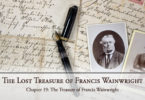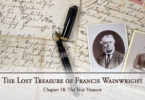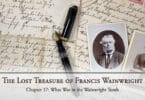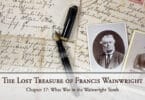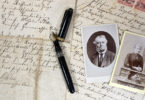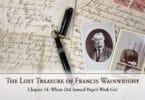With another few clinks and some digging, the cousins held in their hands an actual metal chest, like the kind in which you might find pirate treasure. It was about two feet by two feet, and also that tall. There was a distinct sound of something moving inside when James gave it a gentle shake. There was also a rusty padlock on the chest. Unfortunately, there was no key, and after another couple of hours of digging in the area, looking for it, there was no sign of one.
“Maybe we can pull it off,” Adam suggested. “That lock is pretty rusty. It might just fall off if we give it a good tug.”
Several tries by each of the cousins ensued, each resulting in the lock staying on the chest with determination.
“I’ve had teeth pulled when I was a kid that came out more easily than that,” Emily complained.
“Well, it can’t be gold or silver in there,” Christine pointed out. “When you shake the chest, it sounds like only one thing is inside, and it’s moving back and forth, not rolling.”
“It might still be valuable,” Grace said, giving the chest another shake.
“Or, just valuable to the Wainwright family and its descendants,” James mused.
Adam took the chest. “Well, we owe it to Grandma to find out what is inside.”
Christine shrugged. “Who’s to say it’s even the Wainwright treasure in there? It could be something else.”
“What else could it be?” Emily wondered.
“Anything,” Grace said.
“Or, another clue to the real treasure,” James suggested. “Either way, Adam is right. We need to open it.”
“How?” Emily wanted to know.
Adam and James nodded at each other as if reading each other’s minds. Adam put the chest down on the ground, one hand on either side of it to keep it steady. The lock faced James. James took the trowel, knelt in the grass, and raised the digging instrument high above his head. Using all his might, he brought the tapered tip of the trowel down on the lock.
It didn’t break, but a huge chunk of rust fell off, taking metal with it.
Emboldened by this, James tried again. And again.
The girls looked on in wonder.
After the sixth try, the lock crumbled and fell off the chest. Everyone stood still, staring. No one even volunteered to open it. This was a momentous occasion. The lost treasure of Francis Wainwright could be in there. Now that they may be so close to the end of their search, it seemed almost irreverent to open it.
They stood there, savoring the moment, but also hesitant to peek at what their distant ancestor took such trouble to hide. Did he really want his descendants looking at this, or was it meant to be hidden forever, something he and Philippa valued as a couple, tucked away in the world in secret?
It was a tougher decision than any of them imagined it would be.
Finally, James decided they had come too far to back off now. Besides, what about all the work of the generations before them? They couldn’t let it go to waste, and their grandmother wanted them to find the treasure. They had to open it, if for no one but her.
Still kneeling, he lifted the lid. Its rusty hinges squeaked loudly in the quiet woods.
“Whoa,” he breathed.
“What is it?” Grace whispered, her voice small, still unsure if this was the right thing to do.
With great reverence, James put both hands in the chest and lifted something out. When he stood, all the cousins gathered around him to gaze at his find.
Wrapped in hemp cloth, which James had already folded back to reveal the prize, was a miniature portrait in a thin, oval frame made of gold. It couldn’t have been more than two inches high and two inches across, the typical size of miniatures from the 16th and 17th centuries.
The subject of the portrait was a beautiful young woman with long, dark hair draped over her smooth, pale shoulders. She wore no adornments on her head, which ladies of wealth typically did back in those days. Instead, she went for a simple “Mona Lisa” -esque style. A pale blue gown with a square neckline and high waist decorated her graceful, thin form. A high forehead, bright red lips, a small and slightly upturned nose, all framed by the brightest blue eyes any of the cousins had ever seen completed the picture. The woman was stunning.
And, though it was difficult to tell by modern standards, she didn’t look like she could be much older than Emily’s 19 years.
Those blue eyes, though tiny, seemed to belong to a real person, a living one, looking at them from the past.
Unable to continue being scrutinized under her bright and piercing gaze, James turned the miniature over to look at the back panel. There it was, immortalized in black paint:
Philippa Sewell, on the eve of her marriage to Francis Wainwright
There were no portrait painters in the early days of the American colonies. Francis and Philippa also got married in England, so that is where the portrait was painted. They must have brought it with them when they immigrated.
They were looking at the actual Philippa Sewell Wainwright.
“Do you know how rare portraits are from this time period?” Grace exclaimed. “Especially of the colonists. They were almost never preserved or even brought to the colonies. There are only a few notable exceptions. This miniature could be worth a fortune.”
“She’s beautiful,” Emily said in amazement. “I wonder how many centuries it’s been since anyone has laid eyes on her?”
“Do you think this is the treasure?” Christine asked.
“It was valuable to Francis, for sure,” James said. “But, I don’t think it’s the treasure. Look, there’s writing on this cloth.”
To be continued in Chapter 12.

